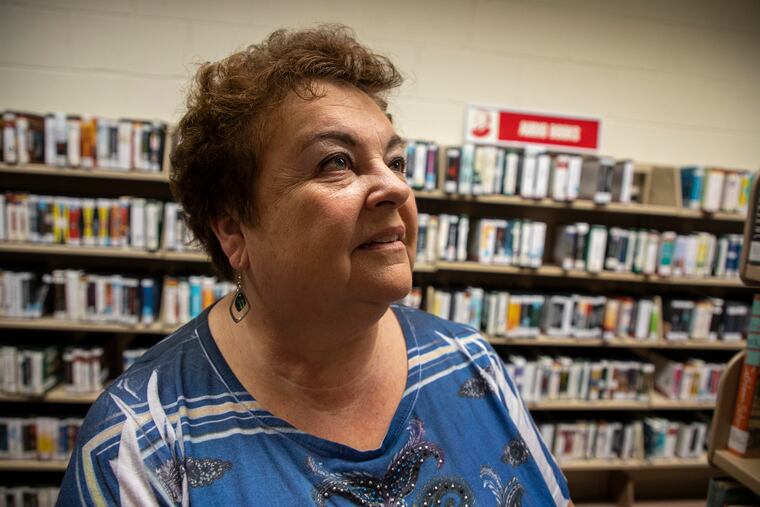A war of words over a city’s public library
Since early 2018, there have been raucous public meetings, impassioned social media comments, fiery op-eds and letters in the local newspaper, an aborted privatization proposal, a narrowly defeated library tax increase referendum, layoffs of the library director and four other staffers, and cutbacks

After early efforts to establish a public library failed, the good people of Vineland didn’t give up.
Thanks largely to the Vineland Woman’s Club, the community’s first public library debuted in 1902. In 1976, the city opened a new and more spacious facility on leafy East Landis Avenue. But that landmark building — a community hub for this diverse and sprawling Cumberland County city of nearly 60,000 — has become the focus of a bitter civic and political battle.
Since early 2018, there have been raucous public meetings, impassioned social-media comments, fiery op-eds and letters in the local newspaper, an aborted privatization proposal, a narrowly defeated library tax increase referendum, layoffs of the library director and four other staffers, and cutbacks of hours. While sharp-elbowed disagreements are not exactly new to Vineland, the tumult has upset some of the library’s 46,000 cardholders, as well as a long devoted, more recently alienated group of supporters called Friends of Vineland Public Library.
Members of this nonprofit organization feel they’ve been treated in a most unfriendly manner despite having helped get the current facility built and helping sustain it with upward of $10,000 in fund-raising annually in the decades since. They don’t understand why this has happened to an organization and a library they dearly love, in a city founded as a utopian experiment where progressive causes such as women’s suffrage were nurtured early on.
"I’m a past president of the Woman’s Club that started the library, I’ve been involved with the Friends for 30 years, and they’ve closed us down,” said Norene Ritter, a retired city elementary- and middle-school teacher. She and other Friends noted their organization pays for ESL instruction at the library, an essential service in a city that is 40 percent Latino.
“They should just let us have our book sale, and our [fund-raising] bus trips, and leave us alone,” she said.
Ritter said Mayor Anthony Fanucci, who took office in 2017, and Jeffrey N. Medio, a Vineland lawyer who represents the library’s recently reconstituted board of trustees, are key architects of a heavy-handed and petty effort to interfere with the historically collegial working partnership of the city, the board, the library staff, and the Friends.
Fanucci and Medio told me they, too, love the library and want it to thrive. The mayor pointed out that the city has recently made more than $180,000 in capital and other improvements to the facility, including new parking, lighting, and soon, window upgrades. “The library is not closing in any way, shape, or form,” Medio said. “Closing or dismantling it are not on the table and have never been discussed,” Fanucci said.
They also said the Friends have not been ostracized and are welcome to support the library. “They should tell the board how and what they want to do, and seek their approval,” said Medio.
The two officials insisted that the facility’s budget and workforce had to be cut (the remaining workers have since unionized) because the city was absorbing payroll, benefit, and other costs that in the past had approached $500,000 above the amount raised through the city’s existing library tax. Fanucci likened the situation to hitting up taxpayers twice, “which isn’t fair,” he said. And some library personnel had been performing tasks related to Friends’ programs and events on city time, said Medio.
“The library was top heavy with administrative positions,” Fanucci said. The layoffs earlier this year were expected to yield a savings of $426,000, according to Vineland’s Daily Journal newspaper. “The library administration wanted to continue operating as an island to themselves, but they wanted money from the city to do that. It was not fair to the taxpayers.”
(Concern about the taxpayers notwithstanding, the mayor and City Council voted to raise their salaries in early 2017; Fanucci’s doubled from $30,000 to $60,000).
On a rainy morning last week, I met Ritter and three other Friends members — Patricia A. Martinelli, Eileen Egizi, and Ginny Cavagnaro — at the library. The four women, all of whom have deep Vineland roots, collectively possess 200 years’ worth of experience as patrons, volunteers, and supporters of the library, which on the day of my visit was bright, clean, and fairly busy.
“My kids love to come here, they love reading. They read two or three at a time," said Yajaria Melendez, a clerical worker and mother of four whom I met in the library parking lot. “I get books, too. Buying books is really expensive.”
Martinelli, the curator of the Vineland Historical and Antiquarian Society, is the author of nine books about regional history and credits the library with “instilling in me a love of reading” at a very early age.
“When I see kids come in to get their first library cards, it just makes me so happy," she said, emotion in her voice. "I know what a wonderful journey they’ve started.”
My hometown library in blue-collar Massachusetts certainly had a profound effect on me. So I get what Martinelli means. I also understand how important a working-class town’s library can be as a community resource.
Fanucci said he would be " happy to meet" with the Friends, and members said they would be willing as well. If both sides love the library as much as they say, surely this patch of common ground offers a starting point for an alliance.
After all, more than a century ago, the good people of Vineland refused to give up on their dream of what a library could do for their community. Their descendants shouldn’t give up, either.